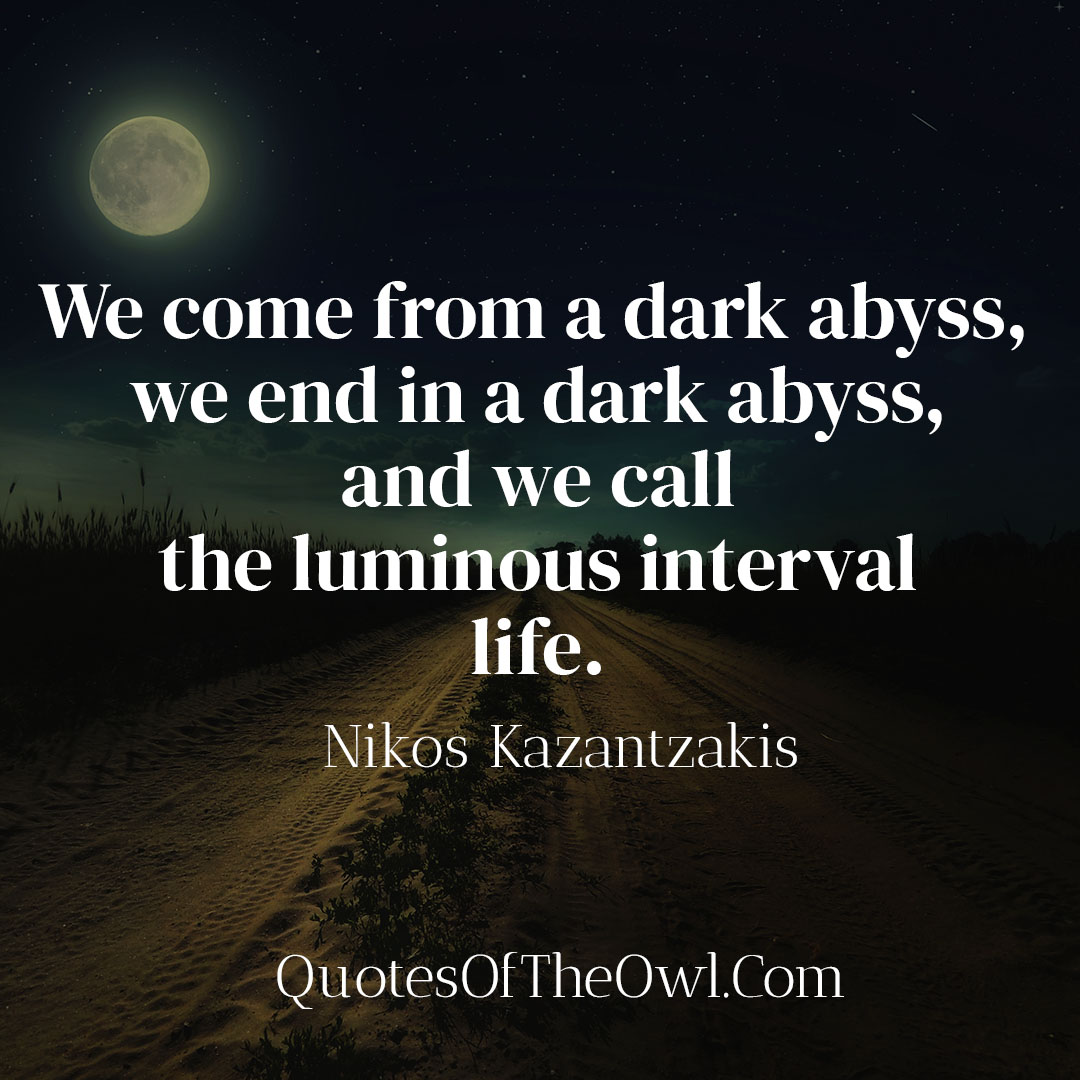What is the meaning of Nikos Kazantzakis’ Quote “We come from a dark abyss, we end in a dark abyss, and we call the luminous interval life”
Nikos Kazantzakis was a Greek writer and philosopher known for his existentialist and metaphysical writings. He was born in 1883 and died in 1957, leaving behind a legacy of literary works that continue to be celebrated today. One of his most famous quotes is “We come from a dark abyss, we end in a dark abyss, and we call the luminous interval life.” In this article, we will explore the meaning of this quote and its significance to existentialism.
What is the Dark Abyss?
The “dark abyss” refers to the unknown and uncertain aspects of life. It represents the mysteries of existence that humans cannot comprehend, such as the nature of death, the purpose of life, and the afterlife. The dark abyss is a metaphor for the deepest and darkest corners of our consciousness that we cannot reach or understand. It is a reminder of our limitations as human beings and the inevitability of our mortality.
Examples of the dark abyss can be found in literature, art, and philosophy. For example, in Dante’s “Inferno,” the dark abyss is represented by the nine circles of hell, where sinners are punished for their transgressions. In the works of Friedrich Nietzsche, the dark abyss is a symbol for the chaos and meaninglessness of existence. In Kazantzakis’ writings, the dark abyss is a recurring theme that reflects his fascination with the unknown.
What is the Luminous Interval?
The “luminous interval” is the brief period of time between birth and death, where we experience life. It is the time when we are conscious and aware of our existence, and we can appreciate the beauty and complexity of the world around us. The luminous interval is a metaphor for the light that illuminates the darkness of the abyss, giving meaning and purpose to our existence.
Examples of the luminous interval can be found in everyday life, such as the moments of joy, love, and happiness that we experience with our family and friends. It can also be found in the pursuit of knowledge, creativity, and spirituality, where we seek to understand and connect with the world around us.
Life as a Luminous Interval
Kazantzakis believed that life is a luminous interval, a fleeting moment of consciousness that is both precious and fragile. He saw life as a journey that begins in darkness and ends in darkness, but in between, there is a brief moment of light that makes it all worthwhile. Life, for Kazantzakis, was about embracing the unknown and finding meaning in the midst of chaos.
Examples of life as a luminous interval can be found in the works of other existentialist thinkers, such as Jean-Paul Sartre and Albert Camus. They too believed that life is a fleeting moment of consciousness, and that we must find our own meaning in a world that is inherently meaningless.
The Significance of the Quote
The quote “We come from a dark abyss, we end in a dark abyss, and we call the luminous interval life” is significant because it captures the essence of the human experience. It speaks to our desire for meaning and purpose in a world that can often seem chaotic and meaningless. It acknowledges the darkness and uncertainty of existence, but also celebrates the beauty and wonder of life.
The quote is also significant to existentialism, a philosophy that emphasizes the individual’s experience of freedom and choice in a world that is inherently meaningless. Existentialists believe that humans must create their own meaning and purpose in life, as there is no inherent meaning or purpose in the universe. Kazantzakis’ quote reflects this existentialist perspective, as it acknowledges the darkness and uncertainty of life, but also affirms the importance of the luminous interval and the meaning that we can create in our lives.
Conclusion
In conclusion, Nikos Kazantzakis’ quote “We come from a dark abyss, we end in a dark abyss, and we call the luminous interval life” is a powerful reminder of the human experience. It acknowledges the darkness and uncertainty of existence, but also celebrates the beauty and wonder of life. The quote is significant to existentialism, a philosophy that emphasizes the individual’s experience of freedom and choice in a world that is inherently meaningless. Kazantzakis’ quote reflects this existentialist perspective, as it acknowledges the darkness and uncertainty of life, but also affirms the importance of the luminous interval and the meaning that we can create in our lives.
Book Recommendations

